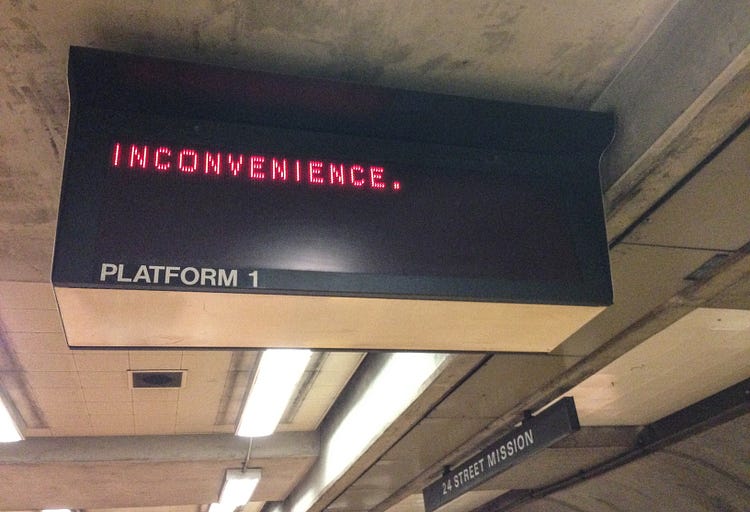Convenience in the Driver’s Seat
 An incovenient platform display. (Tony Webster, Flickr)
An incovenient platform display. (Tony Webster, Flickr)
Google Assistant, Siri, Amazon Echo… Technology has always been a part of human reality and will continue to be so. This piece is not about technology but about convenience.
Technology within the past decades has made our lives evidently more “convenient”. It is ultimately driven by human laziness and the subsequent drive to efficiency, which has turned out to be rather useful. We can do things quicker and better and so release our brain capacity to do other things. But is there a tipping point? A point after which increasing convenience does not actually help us anymore but leads to being counter-productive, and even exposure to risks we can’t manage.
This applies especially well to entertainment, smart phones have made access to all sorts of entertainment virtually possible anywhere and anytime. Voice-controlled phones can already run small chores for us and with map applications no one can really become lost. Implications have transformed many aspects of life already. Dating (date apps), car rental (car sharing), take away (food delivery) and personal economy (mobile banking) to name a few.
In most of these cases this means reduction of human-human interaction. No more engaging with a person when checking a rental car or go around in bars asking people whether they are looking for a relationship or not. Or even asking for directions — a tourist getting lost probably rather finds a cafe with WiFi instead of interacting with a local.
Convenience typically means efficiency and people are in many regards not the most efficient components of any process. This also drives intellectually and emotionally deprived discussion, dominant in at least the Western democracies I follow right now (Finland, UK, U.S.). Empathy and sympathy towards individuals are almost built into us but they diminish if the subject is intangible. For example convenience in low paid services hides the work done by other human being. If minimum wage work becomes work done under the curtain of applications and technology, it is quite probable that social cohesion diminishes.
Convenience is changing the fabric of public discussion too. Easy access to spread and consume ideas is arguably good but seems to also lead to a flip-side, counter-arguments are easy to filter out. Mass media is a good example of this, one of the great failures of free speech where ideologies have not been subjected to rigor debate, out of inconvenience. The inconvenience of encountering opposing arguments and adjusting own belief systems is low on demand, and the supply indeed has remained low. For individuals the idea of not getting offended is convenient since it does not subject ideas to competition or tests.
The supposed urge for convenience deserves some thought. Convenience could be intellectually and emotionally passivating us. Convenience means we lack robustness and antifragility, as N.N. Taaleb would put it. Convenient everyday life is so tempting that we are willing to accept systems that are not sustainable. Everyone is pretty much somewhat cognitively aware that the constant data mining of our actions could any day be used against us. But we are still willing to give it a pass this that, in name of convenience.
Intellectually and emotionally passive people could mean that large-scale movements are harder to invoke. It is harder and harder to get a population clinging on everyday convenience to take real physical action for common goals. A society most concerned on the operation of iPhone and having Google available might be hard to make fight wars or get to rebel, not necessary a bad thing in that sense. Easily controllable but also harder to get moving. Ohh, climate change is bad but it was also so warm and nice outside! And there is always air conditioning. Something truly disruptive might need to happen to break the illusions.
Before that we should either enjoy the ride or start deliberately supporting structures that would be sustainable and robust. Stop building systems we know are inherently rigged and fragile. Be aware of what technology is used for. Change would be tough in the short-term, requiring a strong narrative, I am rooting for something controlled, civil and creative. A narrative that would be more powerful than the current hollow promise of material satisfaction being fulfilling. The first step would be in admitting the problem and letting go of the presumption of status quo.
To practitioners out there,
Eramismus
This post was originally published in Medium
I am a practical Finn with interests spanning energy, digitalisation and society. I am currently working towards a PhD in England. Among other things I try to explore the layered nature of sustainability through philosophy and technology.

